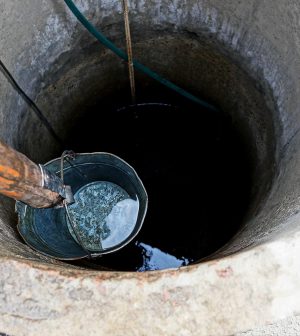- Could Your Grocery Store Meat Be Causing Recurring UTIs?
- Are You Making This Expensive Thermostat Error This Winter?
- Recognizing the Signs of Hypothyroidism
- 10 Strategies to Overcome Insomnia
- Could Artificial Sweeteners Be Aging the Brain Faster?
- Techniques for Soothing Your Nervous System
- Does the Water in Your House Smell Funny? Here’s Why
- Can a Daily Dose of Apple Cider Vinegar Actually Aid Weight Loss?
- 6 Health Beverages That Can Actually Spike Your Blood Sugar
- Treatment Options for Social Anxiety Disorder
Well Water Germ Tests May Depend on Time of Year

Researchers studying well water found current monitoring practices often fail to reflect actual groundwater pollution risks.
The problem: Spikes in harmful bacteria, like those from animal and human waste, vary depending on the season. They may be higher at times when testing is less likely to be done.
“This is concerning because many residents and homeowners across the country, including here in the Northeast, have been found to test their wells in colder months, which can cause a false sense of security and underestimate the true threat of harmful bacteria in their drinking water,” said study co-author Ranjit Bawa, a visiting assistant professor of natural resources and the environment at the University of New Hampshire in Durham.
The research team studied this by looking at year-round water samples from nearly 50,000 wells across the state of North Carolina between 2013 and 2018.
The investigators found a significant gap in the timing of sample collection from private wells and when they were likely to become contaminated.
More than 44 million people in the United States depend on private drinking water wells. These wells are not federally regulated, the study authors noted in a university news release.
Communities without access to public water systems also tend to be near sources of industrial and agricultural pollution, according to the report.
The researchers focused on wells near hog farm waste pits, called lagoons, to look for spikes in fecal coliform and Escherichia coli (E. coli).
Although they found links between temperature and bacteria levels, they did not find a link between bacteria and rainfall.
Highest bacteria levels found were in summer months when temperatures topped 90 degrees Fahrenheit, which is common in North Carolina. The lowest levels were found in February and March.
The investigators also examined other possible contaminants, but found failing septic systems, poultry operations, coal ash impoundments, hazardous waste sites and dry-cleaning solvent sites did not relate to the seasonal spikes in total coliform and E. coli.
“Our findings underscore the need to refine federal guidelines that would not only recommend once-a-year testing for bacteria in private wells but also offer more guidance on seasonal timing,” said lead author Jacob Hochard, assistant professor of conservation economics at the University of Wyoming, in Laramie.
The findings have implications for national and global water sources, especially those that could be contaminated from nearby surface sources of human and animal waste, the study authors said.
Closing the gap between perceived and actual risks of drinking water contamination could help improve public health, they added, especially for rural and underserved populations that depend on well water. In the long-term, this type of private well monitoring could also increase the feasibility of predicting environmental exposures in sparsely populated areas that are otherwise costly to monitor, the researchers said.
The study findings were published in the April issue of the journal Science of the Total Environment.
More information
The U.S. Environmental Protection Agency has more on well water contaminants.
SOURCE: University of New Hampshire, news release, Feb. 7, 2023
Source: HealthDay
Copyright © 2026 HealthDay. All rights reserved.










